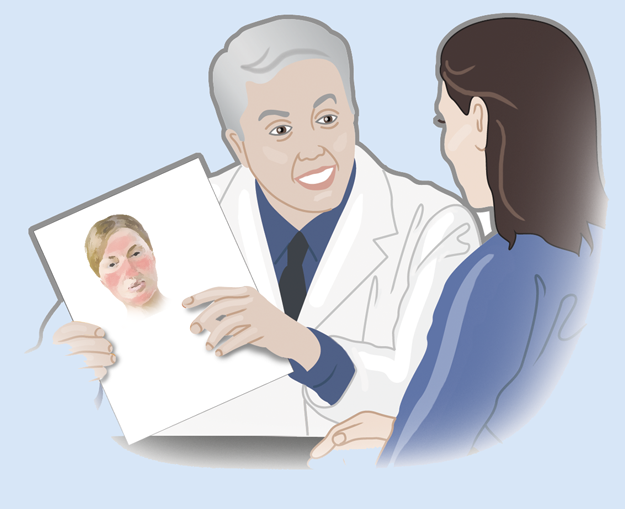About Rosacea
WHEN SHOULD I SEE A DOCTOR ABOUT MY ROSACEA?
- You may need to see a dermatologist who is a doctor who works with patients who are having problems with their skin and who can help you bring your rosacea under control.12
- Do you have noticeable areas of redness on your face that do not go away?
- Do you feel embarrassed, socially anxious, frustrated, or low about deep flushing or redness on your face or neck?
- Does your skin burn, sting, or swell during periods of flushing?
- Do you have pimples, red bumps, and persistent red areas on your face?
- Are your eyes frequently bloodshot, watery, and irritated?
- If your family doctor suspects rosacea, he or she may refer you to a dermatologist for treatment.

WHAT IS THE PROGNOSIS?
- Rosacea is a chronic disorder that can be managed; dermatologists work with their patients to reduce swelling and improve the appearance of the skin.6
- There is often a psychological impact on people who suffer from rosacea. Individuals have reported feeling anxious, depressed, frustrated, embarrassed, having low self-esteem, and experiencing problems in their marriages or at work.1,8
ARE THERE TREATMENTS FOR ROSACEA?
On the horizon
- Researchers continue to search for new insight into rosacea and are producing new studies on the role of cathelicidins, the immune response, and skin barriers.6
- Researchers are also investigating potential probiotic therapies that could be applied directly to the skin.6
REFERENCES
- Rosacea. Canadian Dermatology Association. http://www.dermatology.ca/skin-hair-nails/skin/rosacea/. Published 2016. Accessed August 19, 2016.
- About Rosacea: What is rosacea? Acne and Rosacea Society of Canada. http://www.rosaceahelp.ca/about-rosacea/what-is-rosacea/. Published 2016. Accessed August 19, 2016.
- Rosacea Overview. Mayo Clinic. http://www.mayoclinic.org/diseases-conditions/rosacea/home/ovc-20235169. Published 2016. Accessed August 19, 2016.
- All About Rosacea. National Rosacea Society. https://www.rosacea.org/patients/allaboutrosacea.php. Published 2016. Accessed August 19, 2016.
- Symptoms and causes. Mayo Clinic. http://www.mayoclinic.org/diseases-conditions/rosacea/symptoms-causes/dxc-20235172. Published 2016. Accessed August 19, 2016.
- Rosacea. National Institute of Arthritis and Musculoskeletal and Skin Diseases. http://www.niams.nih.gov/Health_Info/Rosacea/default.asp#1. Published April 2016. Accessed August 19, 2016.
- Rosacea: Who Gets and Causes. American Academy of Dermatology. https://www.aad.org/public/diseases/acne-and-rosacea/rosacea#causes. Published 2016. Accessed August 19, 2016.
- Rosacea: Signs and Symptoms. American Academy of Dermatology. https://www.aad.org/public/diseases/acne-and-rosacea/rosacea#causes. Published 2016. Accessed August 19, 2016.
